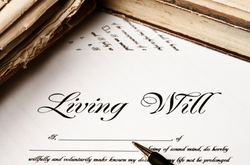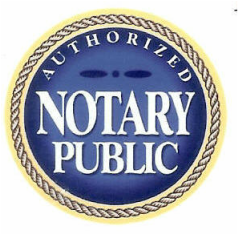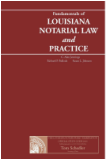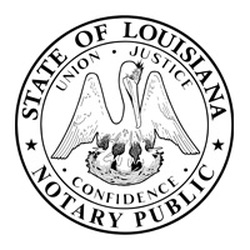 I know that the Louisiana notary exam can be an overwhelming experience. So many people have had to take this exam more than once - some more than three times before successful passage. Why is this test so hard? Did you know that the Louisiana notary test is the HARDEST in the country? This is because, unlike any other notary in the United States, the Louisiana notary is vested with some of the same rights, privileges, authority and obligations as attorneys. We are considered "non-attorney" notaries. Before I go any further, I have to place in this little BLURB: NOT ALL ATTORNEYS ARE NOTARIES. It is extremely important that we are knowledgeable in Louisiana law in order to provide, you, our customer, with the best possible service. So, the question is: "Can You Pass the Test?" Of course you can pass the test. But you must put in the time it takes to study the material. This is definitely a test that you can't CRAM for. This is definitely a test that resting upon memorization of terms will NOT ensure passage. You have to KNOW the material. Point blank!! It is important that you take some sort of course to prepare for the exam, especially if you do not have legal background. Some of these courses are rather expensive. Some "notaries in training" have opted for study groups, which are really good as you receive more hands-on, one-on-one time to have questions answered. Assigned Signers offers a study group wherein questions are answered and real-life scenarios are played out. You will leave this study session with confidence that you have been prepared to not only TAKE the Louisiana Notary Exam, but to also PASS it!!! The Louisiana notary exam consists of two parts:
Remember, if this is something you want BADLY enough, you can do it!!! It won't come easy but once you have passed the test, you are a Louisiana Civil Law Notary, commissioned for LIFE!!! It only takes time, persistence, discipline, prayer, and lots of hard work. BUT IT'S WORTH IT!!! BECOME A NOTARY!!!!
6 Comments
 A Living Will is a witnessed document, statement or expression voluntarily made with instructions that explain your wishes for healthcare if you have a terminal and irreversible condition or are in a continual profound comatose state. When you are not able to tell your family, caregiver, or healthcare provider about your healthcare wishes, you may not receive the kind of care you want. If you cannot make healthcare decisions, your family members or caregivers will make these decisions. Making healthcare decisions can be very stressful for a family. There may be confusion about your wishes and disagreements among family members. It is best to state your wishes for care while you are healthy and able to do so. As an adult (18 years or older) you can, at any time, write wishes and instructions for your family, caregivers, and all healthcare providers. However, the following guidelines are important:
If you haven't looked into having a Living Will prepared on your behalf, I recommend doing so as soon as possible. Don't wait until you HAVE to have something in place as it relates to your healthcare. Things happen quickly and usually without warning. It's always best to have this document and NOT need it versus needing it and NOT having it already prepared. Louisiana notaries are empowered and authorized to prepare and to notarize this document on your behalf. We have the expertise to tailor it to your specific needs and wishes while at the same time adhering to Louisiana law. As I always state, there is no need to seek an attorney unless your are requesting legal advice, a legal opinion, or will be appearing before a judge. Otherwise, a notary is perfectly capable of providing you with perfectly prepared legal documents without having to pay those outstanding attorney fees. Far too often I'm asked this question: "What is the difference between notaries in Louisiana and notaries everywhere else?" Well, this is a great question.
Here in Louisiana, we are considered Civil Law Notaries. Every other notary (meaning in the other 49 states of this country) are Notaries Public. Here's the difference. Wikipedia gives a wonderful definition, which I will paraphrase below: Civil Law Notaries draft, take and record legal instruments and are vested as public officials with the authentication power of the State. Unlike Notaries Public, Civil Law Notaries are highly trained, licensed practitioners providing a full range of regulated legal services. Civil Law Notaries often receive the same education as attorneys at civil law but without qualifications in procedural law. In other words, Civil Law Notaries are trained in civil law, must know civil law but are not practicing the law as an attorney does. We can, however, prepare the same documents but can't appear before a judge on your behalf. In essence, our role is limited to drafting, authenticating and registering certain types of transactional or legal instruments. The most common areas of practice for Civil Law Notaries are in residential and commercial conveyancing and registration, contract drafting, company formation, successions, estate planning and powers of attorney. So, as I've always said, unless you are appearing in court and your document needs to be signed by a judge, please see a Civil Law Notary. You can receive the same level of expertise without paying the expertise fees charged by attorneys. The Power of Powers of Attorney
 A notary in Louisiana is quite different from any other notary in this country in that we are CIVIL LAW NOTARIES. We are extensively tested on our knowledge of the law as well as our procedural knowledge. We have the same privileges as that of an attorney EXCEPT we cannot practice law, nor can we give you legal advice. In other words, we cannot go before a judge on your behalf!! We can only give INFORMATION!!! Think about it!!! You may seek out an attorney to get legal advice or to file a lawsuit. During these times, and during these times ONLY will an attorney actually "sign off" on the document AS an attorney. If you seek an attorney to draft a document for you (i.e., will, power of attorney, mortgage, etc.), the attorney is actually signing off as a NOTARY, not as an attorney. Most people are not aware of this fact. Please don't spend extra money hiring an attorney to do exactly what a notary can do. You will still receive an excellently prepared document for HALF the cost! Knowledge is power. Before you pay an attorney .... COME SEE A NOTARY!!! |
Details
All Posts Written by: Shannon BarnesShannon Barnes is a Louisiana civil law notary, having statewide jurisdiction and over 25 years of legal experience. This blog is designed to provide knowledge and information not ordinarily obtained through conventional means. Archives
June 2015
Categories |



 RSS Feed
RSS Feed
